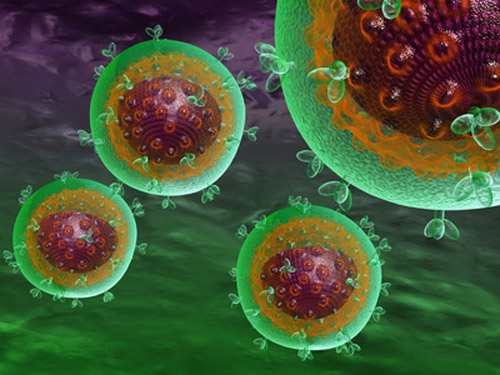一国际研究小组近日称,他们找到了一种阻止艾滋病病毒破坏免疫系统的方法,通过移除艾滋病病毒外膜中的胆固醇,即可有效阻止病毒对人体免疫系统的损害。这一发表在最新一期《血液》杂志上的研究成果对开发艾滋病疫苗具有重大意义。

艾滋病是由感染艾滋病病毒(HIV)所引起。通常,当一个人被某种病毒或细菌感染时,其免疫系统会自然而然地进行防御。而一些研究人员认为,艾滋病病毒会使人体防卫功能的第一道防线——非特异性免疫反应过度,从而削弱免疫系统的下一道防线——特异性免疫反应,进而使人体整个免疫机制遭到破坏。
英美意等国科学家在《血液》杂志上发表的论文表明,如果将病毒外膜中的胆固醇去除,会阻止艾滋病病毒引发非特异性免疫反应,这样艾滋病病毒就不能损害免疫系统了。当研究人员将胆固醇移除后,他们发现这阻止了艾滋病病毒引发非特异性免疫反应,并导致了由免疫细胞T细胞介导的特异性反应更加强烈。这一结果支持了科学家的上述假设,即艾滋病病毒通过过度刺激非特异性免疫反应,从而削弱免疫系统的防御能力。
论文作者之一、英国帝国理工学院的阿德里亚诺·博厄索博士指出,艾滋病病毒通过刺激人的过度免疫反应来破坏免疫系统,这可能也是为什么培养艾滋病疫苗如此困难的原因之一。大多数疫苗主要通过非特异性反应来识别入侵者,但如果病毒引发了其他机制,削弱了非特异性反应,疫苗就会很难起到作用。
通常,免疫细胞浆细胞样树突状细胞(pDCs)能够快速识别艾滋病病毒,并产生信号分子——干扰素来反应。这些信号会激活各种生理流程,其一开始虽然十分有益,但长时间作用则会损害免疫系统。研究人员发现,如果移除艾滋病病毒包膜中的胆固醇,艾滋病病毒就不能再激活pDCs,这样,T细胞就会更有效地对抗病毒。研究人员使用不同浓度的β-环糊精移除胆固醇,进而生产出外膜有着孔洞的艾滋病病毒。这种有穿孔的病毒没有传染性,不能刺激pDCs,但仍能被T细胞识别。
“这就像是军队失去了武器,但仍有旗帜在,其他队伍一样可以识别并对其进行攻击。”博厄索说。他的科研团队目前正在研究是否可利用这种不活化病毒开发艾滋病疫苗。
生物探索推荐英文论文摘要:
Over-activation of plasmacytoid dendritic cell inhibits anti-viral T-cell responses: a model for HIV immunopathogenesis
A delicate balance between immunostimulatory and immunosuppressive signals mediated by dendritic cells (DC) and other antigen-presenting cells (APC) regulates the strength and efficacy of anti-viral T cell responses. The human immunodeficiency virus (HIV) is a potent activator of plasmacytoid DC (pDC). Chronic pDC activation by HIV promotes the pathogenesis of the acquired human immunodeficiency syndrome (AIDS). Cholesterol is pivotal in maintaining HIV envelope integrity and allowing HIV-cell interaction. By depleting envelope-associated cholesterol to different degrees, we generated virions with reduced ability to activate pDC. We found that APC activation was dissociated from the induction of type I interferon (IFN-α/β) and indoleamine 2,3-dioxygenase-mediated immunosuppression in vitro. Extensive cholesterol withdrawal, resulting in partial protein and RNA loss from the virions, renderedHIV a more powerful recall immunogen for stimulating memory CD8 T cell responses in HIV-exposed uninfected individuals. These enhanced responses were dependent on the inability of cholesterol-depleted HIV to induce IFN-α/β.







